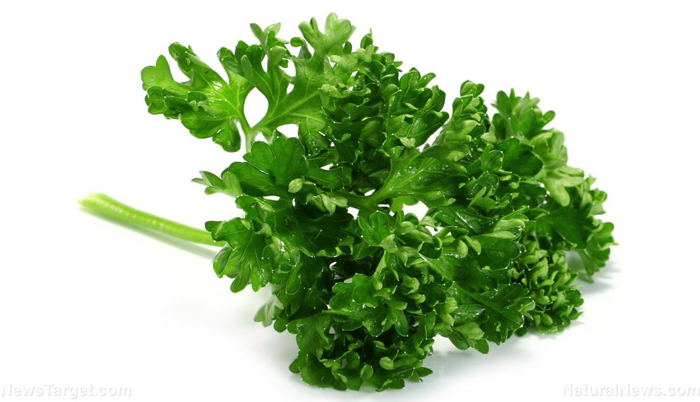![]() Home > Health
Home > Health
Study Shows Apigenin, A Compound In Parsley, Offers Cancer-Fighting Benefits

News Target | Natural News
![]() June 13th, 2022 | 16:36 PM |
June 13th, 2022 | 16:36 PM | ![]() 866 views
866 views
NATURALNEWS
Parsley is normally used as a garnish and not as the star of a main dish. But according to a study, parsley deserves a bit of the culinary limelight too, especially since it contains apigenin, a compound that can help fight cancer.
Parsley is a superfood full of beneficial antioxidants that offer many health benefits. Additionally, parsley components have been found to improve liver function as well as vision and eye health.
A large amount of data also backs up parsley’s anti-cancer properties.
Apigenin, a compound with anti-cancer activities
Parsley contains apigenin, a compound famous for its anti-cancer abilities. To date, there are over 600 journal articles indexed in PubMed about the benefits of parsley and apigenin when it comes to fighting and preventing cancer.
Meanwhile, research published in the journal Oncotarget showed for the first time how apigenin helps slow the production of the enzyme IKKa, which is linked to the growth and progression of cancer. According to the research team, apigenin has a powerful ability to slow cancer progression or even stop it altogether.
Other studies also attest to apigenin’s amazing anti-cancer properties:
In a 2008 clinical trial, scientists combined apigenin with green tea to successfully treat colon cancer.
A 2012 University of Missouri study showed that apigenin was effective against breast cancer.
In a 2013 study, researchers reported that apigenin killed at least 86 percent of lung cancer cells.
Parsley contains volatile oils that help neutralize certain carcinogens. The herb is also full of carotenoids, which protect against cancer-causing cell damage.
Parsley is also considered a “chemoprotective” food because of its impressive ability to protect healthy tissues in the body from the toxic effects of various cancer treatments or drugs.
Don’t just use parsley as a garnish. After all, it’s a superfood with powerful anti-inflammatory and antioxidant properties.
Parsley is also full of vitamins A, C and E, along with nutrients like beta-carotene, folate, chlorophyll, fiber, lutein, zeaxanthin and cryptoxanthin.
Two tablespoons (eight grams) of parsley only have two calories. The same serving also contains:
Vitamin A – 12 percent of the Reference Daily Intake (RDI)
Vitamin C – 16 percent of the RDI
Vitamin K – 154 percent of the RDI
Vitamin A is an essential nutrient with a crucial role in your immunity and eye health. Additionally, you need vitamin A to maintain your skin health. Vitamin A may also help improve skin conditions like acne.
The vitamin C in parsley can help boost your heart health and is vital to your immune system. The vitamin is also a potent antioxidant that protects your cells from harmful free radical damage.
Finally, the vitamin K in parsley is needed for your bone and heart health. Consuming just two tablespoons of parsley delivers more vitamin K than you need per day. Parsley contains more vitamin K than kale.
Vitamin K is essential for proper blood clotting, which can help prevent excessive bleeding.
Sources of apigenin
Dried parsley is one of the most potent sources of apigenin, with about 13,000 mg per 100 grams. Meanwhile, fresh parsley contains from 225 to 300 mg of apigenin per 100 grams.
If you wish to enjoy the anti-cancer effects of apigenin, you only need 10 mg of parsley per day. This is the equivalent of about a tablespoon of chopped fresh parsley or a pinch of the dried herb.
Other food sources of apigenin include celery, chamomile tea, grapefruit, peppermint, rutabagas and thyme. If you’re cooking with parsley, add it at the very end because the heat can reduce apigenin’s cancer-fighting and health-sustaining qualities.
Eat more nutritious leafy greens like parsley and follow a balanced diet to maintain your overall health.
Source:
courtesy of NATURALNEWS
by Zoey Sky
If you have any stories or news that you would like to share with the global online community, please feel free to share it with us by contacting us directly at [email protected]